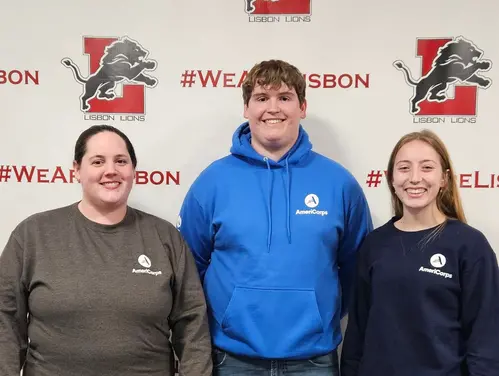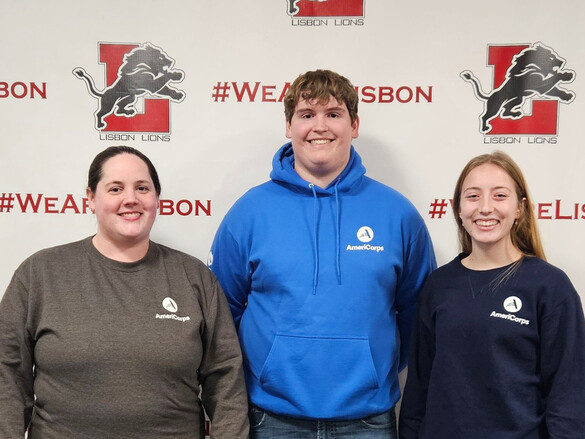At Lisbon Community School District, it’s all hands-on deck when assisting high school students for life after graduation. It is typical to see teachers, school counselors and other staff invested in postsecondary readiness for students. But don’t forget, one of the most effective resources for any school is the students, themselves.
This academic year marks the first year Lisbon has empowered AmeriCorps student leaders, allowing two high school seniors to provide guidance and modeling to their peers who are preparing for next steps in their college and career pathways.
Maeve Krogmann and Payton Donohoe, both 17-year-old seniors at Lisbon High School, are the school’s first AmeriCorps student leaders. During this school year, the pair have assisted their classmates with things like the Free Application for Federal Student Aid (FAFSA), scholarship applications, college essays, information on Registered Apprenticeships and more.
“The accessibility of student leaders is helpful to our peers,” Maeve said. “Our school counselor is responsible for students in seventh through 12th grade, and there is always someone who needs to talk to her. Having a couple of student leaders allows peers to ask their questions about college and careers more quickly.”
The AmeriCorps student leaders are a part of the Iowa Department of Education’s overall College Access and Success AmeriCorps initiative. This work connects to the momentum of the Course to College program, which supports high schools in building a college-going culture with students. The College Access and Success AmeriCorps program assists Iowa high school and college students and helps prepare them for postsecondary success. Along with student leaders, the College Access and Success AmeriCorps program also features college coaches and summer transition associates.
Currently, there are 41 AmeriCorps student leaders, like Maeve and Payton, serving in 22 high schools across the state. They are expected to serve 300 hours during the school year, which typically amounts to seven to eight hours a week. In that time, student leaders leave a significant mark on students and their schools.
“AmeriCorps student leaders can make an immediate impact within their high schools,” said Thomata Doe, coordinator for the Department’s AmeriCorps student leader program. “With their site supervisors, they help create a college-going culture and advocate for future-ready programs and high-demand careers with their peers.”
For their participation in the program, student leaders earn a small living allowance during the school year as well as a bonus upon completion of their 300 required hours. Additionally, student leaders earn an education award of nearly $1,500 that they can use toward their postsecondary goals. The allowance and education award are good incentives for the leaders, but both Maeve and Payton note there are other personal advantages to serving as a student leader.
“Being a student leader not only helps other students, it helps you continue to develop your own skills,” Payton said. “I’ve definitely worked on time management, communication and other organizational skills through this experience.”
School counselor Christina Meierotto serves as the high school’s site supervisor and was responsible for getting the new leadership program off the ground at Lisbon. She selected Maeve and Payton for the school’s first student leaders and knew they would excel in the leadership positions.
“I really looked for students who were responsible and had a good idea of what they wanted to do with their futures,” she said. “Both Maeve and Payton are engaging students who are willing to go out of their comfort zones to work with classmates. They are truly seen as leaders by their peers.”
Lisbon’s two student leaders provide quick, individual counsel to their peers at lockers in hallways, in the cafeteria and at the end of classes. In addition, group events focused on postsecondary readiness provide opportunities for Maeve and Payton to reach even more of their classmates. With oversight by Meierotto, Maeve and Payton coordinate events like Decision Day or FAFSA informational sessions. They plan many things for these events from logistics to promotional emails to the distribution of scholarship paperwork and other materials.
“I like both the large events and the individual sessions,” Payton said. “In a large group event, you can reach a lot of people in a short amount of time. It’s nice to be the go-to person for students who have questions.”
With the introduction of the Better 2024-25 FAFSA form in December, Lisbon’s student leaders have been sought after quite frequently, too.
“FAFSA has definitely been a top question from students recently,” Maeve said. “But by answering questions and helping others with it, it has strengthened my own knowledge on the FAFSA process and what I need to do for my own application.”
While assisting their classmates this year, Maeve and Payton are balancing full academic and extracurricular schedules. Both are participating in concurrent enrollment this year and are earning college credits at Kirkwood Community College. They are using the information they provide on college preparedness for their own futures, with each planning to attend college after graduation. Maeve is looking forward to next year at Iowa State University and will focus on environmental engineering. Meanwhile, Payton is anticipating moving onward to Mount Mercy University and will pursue dual bachelor degrees in nursing and public health.
Both Maeve and Payton agree that their experiences as AmeriCorps student leaders have been beneficial for Lisbon, and they encourage other districts to take a look at how it can support students with college and career readiness.
“It’s definitely a good program,” Payton said. “I hope other schools can implement it.”
AmeriCorps, the federal agency for national service and volunteerism, provides opportunities for Americans to serve their country domestically, address the nation’s most pressing challenges, improve lives and communities, and strengthen civic engagement. Each year, the agency places more than 200,000 AmeriCorps members and AmeriCorps Seniors volunteers in intensive service roles; and empowers millions more to serve as long-term, short-term, or one-time volunteers. Learn more at AmeriCorps.gov.

